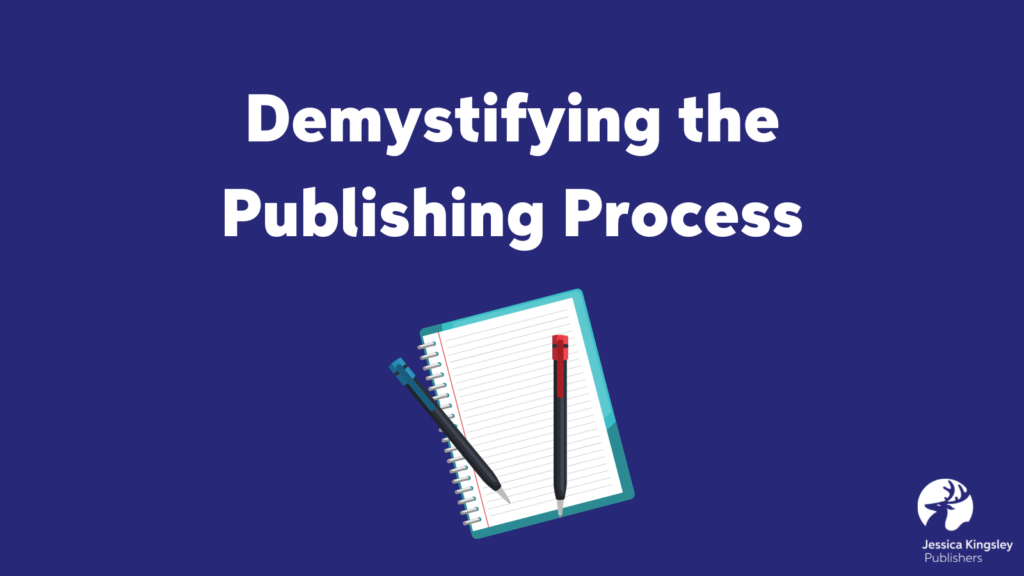
Demystifying the Publishing Process
Have you got an idea for a book? Always wanted to be a ‘published author,’ but don’t know where to start? Or maybe you are a professional who wants to share insights into your area of expertise and think a book might be the best way to get your message across? The publishing process can be opaque from the outside, and every publisher may seem to do things differently.
In this blog, we lay out the first steps on the road to getting published, with a focus on how we do things at Jessica Kingsley Publishers (JKP). JKP is a leading specialist global publisher at the forefront of social change. The purpose of JKP’s publishing is to bring about positive change in society and encourage social justice by making information and knowledge available in an accessible and affordable way.
Choosing the right publisher for you
It’s important when thinking about sending a book proposal to a publisher or agent, to find the publisher that works best for you. There’s lots of publishing models, from traditional publishing to self-publishing and crowdfunded publishing. Many major publishers will require you to have an agent and don’t accept unsolicited submissions, while some independent or ‘specialist’ (for example, a publisher who solely publishes on history), will accept submissions from authors without an agent. If you want to find out more about publishing in general, our Editorial Director, Andrew James, has written an article about the different types of publishers and models, here.
In ‘traditional’ publishing, the publisher selects books to publish, and authors receive a percentage of money (royalties) from the sales. A traditional publisher manages and pays for the book production process, from contract to publication. They organise marketing and distribution for authors. JKP follows this model.
We have an open submissions policy. You don’t need an agent to be able to send us your book idea (though we are happy to consider agented projects as well!). You can send a proposal directly to us, as we want to hear from members of the community for whom we publish and make sure we’re commissioning books that genuinely help and empower them.
If you are interested in submitting a book idea to JKP, we’d recommend starting off by taking a look at our website, jkp.com, and asking:
- Do we publish on the subject of your idea, or on related topics?
- Is one of our editors looking for ideas that reflect what you want to publish?
- Do you have perspective, experience or knowledge that will inspire, help or educate readers?
- Could you see your proposed book on a bookshelf alongside ones we have recently published?
- Does our Publishing Mission speak to you?
You could also check out our social media feeds on Twitter, Instagram and Facebook.
Think JKP is the right publisher for you? The next step is to start writing your book proposal…
Writing your book proposal
A book proposal is an important document for setting out your vision for the book, providing a prospective publisher with as much detail as possible about your project and yourself. It’s always best to provide as much detail as possible in the proposal, especially regarding:
- chapter summaries,
- detail on the competition and how your book will sit alongside this,
- the market and who the book is specifically for.
Providing concise and well-researched information on the above will really help to speed up the commissioning process. We recommend that you also add as much about your own platform in terms of your social media presence, your networks and routes to market, or mention if you have. Most publishers will have a proposal form you can download from their website. When you are filling out a book proposal form for your idea, you should focus on what your book will offer that other content does not – what is the ‘unique selling point’ (USP) for the customer?
Sending your proposal to the publisher
At JKP, we accept book proposals through our online portal Submittable, here.
When you submit a proposal to us, it will be assigned to the most relevant commissioning editor. These are the people who make decisions about what an organisation will publish. They will review the proposal and discuss with fellow editorial, marketing and sales colleagues. If your idea gets taken forwards, the proposal will be pitched at a board meeting and if successful there it will be moved on to contract stage, where the delivery date of the book is agreed.
Other publishers may have a slightly different process, but proposals are usually assessed by publishing professionals across departments. This means an initial response from us can take up to two months, so please don’t worry if you don’t hear back straight away!
If you’d like to learn more about the process of getting published, we recommend these resources:
www.writersandartists.co.uk/advice/how-write-non-fiction-proposal-and-get-agent
www.waterstones.com/help/how-to-get-published/156
www.janefriedman.com/start-here-how-to-get-your-book-published/
If you liked this article, why not join our mailing list to receive more content like this? You may unsubscribe at any time.